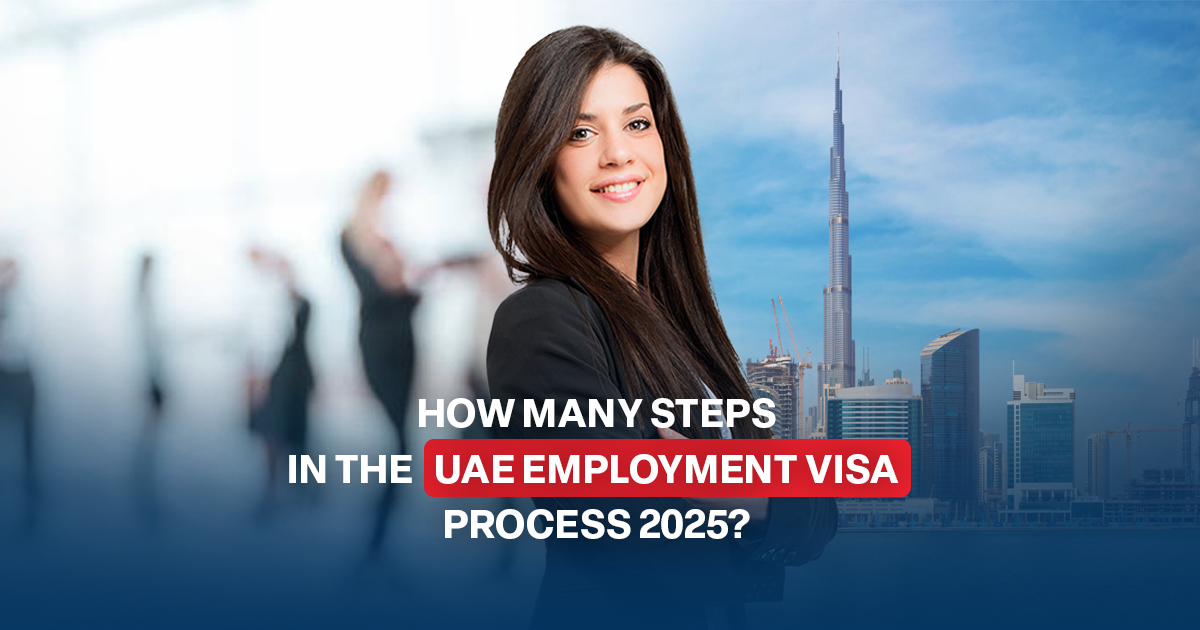Dreaming of a thriving career in the heart of the Middle East? The United Arab Emirates continues to be a magnet for professionals worldwide, offering seamless uae employment visa processe. In fact, the UAE issued over 490,000 new work permits in just the first half of 2024, reflecting its ever-growing demand for talent.
In this guide, we’ll walk you through the , breaking down each step to help you navigate the uae employment visa processe with ease. Whether you’re aiming for a corporate role in Dubai’s skyscrapers or pursuing a tech career in Abu Dhabi’s innovation hubs, understanding the visa procedure is your first step to success. Ready to unlock your future in the Emirates? Let’s dive in!
Table of contents
|
What is the UAE Employment Visa Process?
The UAE employment visa process is essential for foreign professionals who want to live and work in the UAE legally. It begins with a job offer from a UAE-based employer, who then applies for a work permit and an entry visa. Once the visa is approved, the employee travels to the UAE and undergoes a mandatory medical examination. After passing the medical test, they apply for an Emirates ID and complete the visa stamping process in their passport.
The entire process usually takes 2 to 4 weeks, depending on the employer’s efficiency and the approval of necessary documents. Ensuring all steps are followed correctly helps avoid delays and allows for a smooth transition into the UAE workforce.
General Requirements for UAE Work Visas
Each UAE work visa has its specific conditions, but there are general requirements that all applicants must fulfill:
- A passport :must be valid for at least six months after the date of admission.
- Entry Permit: Obtained before applying for a work visa, usually sponsored by an employer or relevant authority.
- Medical Fitness Test: Conducted at an approved UAE medical center to confirm health status.
- Emirates ID Application: Required for all residents after visa approval.
- Good Conduct Certificate: In some cases, applicants must provide a police clearance certificate from their home country.
Need a UAE Work Visa? 10 Types to Choose From!
The UAE offers various employment visas designed for professionals, entrepreneurs, and investors looking to work and live in the country. Whether you’re planning to join a company, start a business, or work independently, selecting the right visa is crucial. This guide will help you navigate the UAE employment visa process, outlining the 10 most common types and their requirements.
Explore more about: The employment visa price in the UAE.
1. Employment Visa
The most common work visa issued to professionals hired by UAE-based companies.
Eligibility Criteria:
- Must have a valid job offer from a registered UAE company.
- Educational qualifications relevant to the job role.
- Work experience as required by the employer.
Required Documents:
- Passport copy and completed visa application form.
- Signed employment contract.
- Attested educational certificates.
- Passport-sized photographs.
Application Process: The employer handles the application through the Ministry of Human Resources and Emiratisation (MOHRE), submitting the necessary documents and paying the fees.
2. Business Visa
Business Visa is Ideal for foreign nationals looking to explore business opportunities, attend meetings, or start a company in the UAE.
Eligibility Criteria:
- Must have a legitimate business reason for visiting the UAE.
- Financial proof to support expenses.
- Company invitation letter (if applicable).
Required Documents:
- Passport copy and visa application form.
- Business-related documents (investment plans, meeting invitations, etc.).
- Proof of financial means.
- Return flight ticket.
Application Process: Applications can be submitted through the UAE embassy, consulate, or an authorized travel agency.
3. Investor Visa
Investor Visa is Designed for individuals who make substantial financial investments in the UAE, such as buying property or starting a business.
Eligibility Criteria:
- Must meet the minimum investment amount set by the government.
- Investment must be in an approved sector.
- Proof of financial stability.
Required Documents:
- Passport copy and completed visa application form.
- Investment proof (property deeds, business ownership certificates).
- Financial documents (bank statements, tax returns).
- Business plan (if investing in a business).
Application Process: Applications go through the respective economic department or free zone authority in the chosen Emirate.
4. Freelancer Visa
Freelancer visa For independent professionals who offer their services without employer sponsorship.
Eligibility Criteria:
- Must engage in an approved freelance profession.
- Educational qualifications and relevant work experience.
- Proof of sufficient income.
Required Documents:
- Passport copy and completed visa application form.
- Freelance license from a UAE free zone.
- Work portfolio and qualifications.
- Bank statements.
Application Process: Applicants must apply through free zone authorities that issue freelance permits.
5. Golden Visa
A long-term residency visa for skilled professionals, investors, and entrepreneurs.
Eligibility Criteria:
- Investors: Must invest in real estate or business.
- Entrepreneurs: Owners of innovative startups or businesses.
- Skilled Professionals: Must have expertise in sectors like technology, engineering, healthcare, or education.
- Outstanding Students: High academic achievers.
Required Documents:
- Passport copy and completed visa application form.
- Proof of investment, business ownership, or academic achievements.
- Letters of recommendation (if applicable).
Application Process: Applications go through the Federal Authority for Identity, Citizenship, Customs & Port Security (ICP).
6. Green Visa
Green Visa is a 5-year residency visa for skilled professionals, investors, and freelancers.
Eligibility Criteria:
- Professionals with a bachelor’s degree and a valid job contract.
- Freelancers with proof of financial stability.
- Investors with a registered business.
Required Documents:
- Passport copy and completed visa application form.
- Proof of employment, investment, or freelance permit.
- Valid health insurance.
Application Process: Applicants can apply via the ICP website or designated government channels.
7. Retirement Visa
For individuals aged 55+ who want to retire in the UAE.
Eligibility Criteria:
- Monthly income of at least AED 20,000.
- Savings of at least AED 1 million.
- Property ownership worth at least AED 2 million.
Required Documents:
- Passport copy and completed visa application form.
- Financial proof (bank statements, pension records, or property documents).
- Health insurance.
Application Process: Processed through ICP or the relevant government department in each Emirate.
8. Student Visa
Issued to students enrolled in UAE universities, they will have a specific number of working hours.
Eligibility Criteria:
- Must have an acceptance letter from an accredited institution.
- Must meet academic and financial stability requirements.
Required Documents:
- Passport copy and completed visa application form.
- Official acceptance letter.
- Academic transcripts.
- Proof of financial means.
Application Process: The educational institution typically assists with the application process.
9. Remote Work Visa
Allows professionals to live in the UAE while working remotely for an overseas employer.
Eligibility Criteria:
- Valid job contract with a company outside the UAE.
- Minimum monthly income of AED 15,000.
- Valid health insurance.
Required Documents:
- Passport copy and completed visa application form.
- Employment contract with salary details.
- Bank statements.
- Proof of health insurance.
Application Process: Applications can be submitted online via ICP.
10. Transit Visa
For travelers with layovers in the UAE lasting between 48 to 96 hours.
Eligibility Criteria:
- Confirmed onward flight ticket.
- Valid passport.
Required Documents:
- Passport copy and completed visa application form.
- Proof of onward travel.
Application Process: Can be applied for through UAE embassies, consulates, or airlines offering visa services.
Choosing the right UAE work visa depends on your job role, investment plans, or study requirements. Understanding the visa options helps ensure a smooth UAE employment visa process. For up-to-date details, check government portals or consult with immigration experts. A well-planned visa application will help you settle in the UAE successfully
UAE Employment Visa Application Process 11 steps
The process of obtaining an employment visa typically involves the following steps:
- Entry Visa Quota Approval: The employer initiates the process by applying for an entry visa quota approval from the Ministry of Human Resources and Emiratisation (MoHRE). This step ensures that the company has the necessary quota to hire foreign workers.
- Submission of Employment Contract: The employer and employee sign an employment contract outlining the terms and conditions of employment, including salary, benefits, and responsibilities. This contract must be submitted to the MoHRE for approval.
- Application for Entry Permit and Work Visa: Once the quota is approved, the employer applies for the employee’s work permit and entry permit through the MoHRE’s online system.
- Issuance of Employment Entry Visa: Upon approval of the work permit, the employee receives an Employment Entry Visa (also known as a pink visa) via email. This visa allows the employee to enter the UAE and proceed with the remaining formalities.
- Entry into the UAE: The employee enters the UAE using the Employment Entry Visa.
- Medical Screening: Upon arrival, the employee undergoes a medical examination at a government-approved clinic.
- Emirates ID Application: After clearing the medical test, the employee applies for an Emirates ID card, a mandatory identification document for UAE residents.
- Residence Visa Application: The employer applies for the employee’s residence visa through the Federal Authority for Identity, Citizenship, Customs, and Port Security (ICP) online system.
- Submission of Labor Contract: The employer submits the attested labor contract to the MoHRE within 14 days of the employee’s arrival in the UAE.
- Health Insurance: The employee obtains health insurance, either through their employer or independently.
- Receipt of Work and Residence Visa: Once all the formalities are completed, the employee receives their work and residence visa, allowing them to live and work in the UAE.
Who Can Get a UAE Employment Visa? 10 Key Rules to Know
Thinking about working in the UAE? The country offers incredible career opportunities, tax-free salaries, and a fast-growing economy. However, before making the move, it’s important to understand whether you qualify for a UAE employment visa process. This guide explains everything you need to know, from general requirements to different visa types available.
General Eligibility Criteria for a UAE Employment Visa
To qualify for a UAE employment visa, applicants must meet specific requirements, including:
- Valid Job Offer – You must have a confirmed job offer from a registered UAE employer.
- Employer Sponsorship – Your employer must sponsor your visa and handle the application process.
- Valid Passport – Your passport should be valid for at least six months from the application date.
- Educational Qualifications – Some jobs require a degree, diploma, or professional certification.
- Work Experience – Many roles require relevant work experience based on industry standards.
- Medical Fitness Test – A health check at an authorized UAE medical center is mandatory.
- Clean Criminal Record – Some applicants need to provide a police clearance certificate.
- Entry Permit – If applying from outside the UAE, your employer must secure an entry permit.
- Minimum Salary Requirement – Certain visas, like the Green Visa, have salary thresholds.
- Freelancers & Investors – Freelancers need a permit, while investors must meet financial criteria.
Is a medical test required for the UAE employment visa process?
Yes, a medical fitness test is mandatory. The tests check for infectious diseases like tuberculosis and HIV. If the test results are positive, the visa will be denied. Medical tests must be done in government-approved centers in the UAE.
How Long Does Each UAE Employment Visa Take? 7Timelines Explained
The UAE employment visa process time depends on the visa type, employer procedures, and government approvals. Some visas take just a few days, while others require weeks. Understanding the timeline helps applicants plan better and avoid unnecessary delays.
Estimated Processing Times for UAE Employment Visas
- Standard Work Visa: Takes 2 to 4 weeks, depending on employer documentation and approvals.
- Free Zone Visa: Usually 5 to 10 days, as free zones have faster processing systems.
- Green Visa: Can take 30 to 45 days due to self-sponsorship verification.
- Golden Visa: requires up to 2 months, as background checks and approvals take longer.
- Freelancer Visa: Takes 10 to 15 days, depending on the issuing authority.
- Investor Visa: Can take 3 to 6 weeks, as financial records and investments must be reviewed.
- Medical Test & Emirates ID Processing: Adds 5 to 7 days to the overall timeline.
Factors That Can Delay Processing
- Missing Documents: Any incorrect or missing paperwork slows down approval.
- Medical Test Clearance: Delays may occur if extra health checks are required.
- Background Checks: Some applicants may need additional security clearance.
- Public Holidays: Visa processing stops on UAE national holidays.
The UAE employment visa process time varies by visa type and employer efficiency. Always check with official UAE immigration channels for updates and expected timelines. Planning ahead ensures a smoother experience.
The Summary
The UAE Employment Visa Process may seem complex, but knowing the steps makes it much easier. From securing a job offer to final visa stamping, each stage is crucial for a smooth transition. Don’t let delays slow you down—stay informed and follow the right steps.
Need expert guidance? Business Link UAE is your one-stop solution for Business setup in UAE helps and all PRO services, simplify the process, ensuring your application is handled efficiently. Ready to start your UAE career? Contact Business Link today and take the first step toward your future!
FAQ’s
Can an employee switch jobs while on a UAE employment visa?
Yes, employees can switch jobs, but they must follow UAE labor laws. The new employer must apply for a visa transfer. Some employees may need to complete a minimum service period before changing jobs. If the visa is canceled, the employee must leave the UAE or get a new visa within the grace period.
What is the validity period of a UAE employment visa?
The UAE employment visa is typically valid for two years for private sector employees and three years for free zone employees. The visa must be renewed before it expires to avoid fines and legal issues.
What happens if an employee overstays their UAE employment visa?
Overstaying a UAE employment visa results in penalties. Employees have a grace period of 30 days after visa expiration to renew or exit the country. If they exceed this period, they will be fined AED 50 per day and may face legal consequences.
Can family members be sponsored under a UAE employment visa?
Yes, employees with a valid UAE employment visa can sponsor their spouse, children, and sometimes parents. The salary requirement for sponsoring family members varies, but usually, an employee must earn at least AED 4,000 or AED 3,000 plus accommodation.
What is the difference between a UAE employment visa and a freelance visa?
A UAE employment visa is tied to an employer, and the company sponsors the employee. A freelance visa allows individuals to work independently in specific fields like media, IT, and design. Freelancers must apply through a free zone authority or specific government programs.




